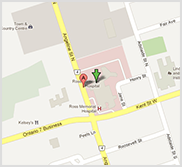New tool helps patients manage after discharge

November 27, 2017 - Leaving hospital can be stressful for patients and their families. Many patients are still recovering and they and their families are often anxious about how to manage at home. This stress can make it difficult to remember instructions from hospital staff upon discharge about when to take medications, what symptoms to look out for and when to schedule follow-up appointments.
A new tool being introduced by Ross Memorial Hospital will help patients better manage their own care after leaving hospital. Hospital discharge plans are usually written for doctors and other healthcare providers caring for the patient and are dense documents filled with technical language. Often, patients do not receive a written discharge summary prepared in a way that is easy for them to understand and follow, to guide their own care at home.
So the Patient Oriented Discharge Summary (PODS) was designed for patients and health care providers to use together to discuss instructions for patients (in a clear and easy-to-understand way) to follow after they leave hospital. These instructions help make patients’ transition to home go as smoothly as possible and increases the chances patients will follow post-hospital care instructions.
PODS highlight five important issues for patients leaving hospital:
1. Medications they need to take
2. How they might feel and what to do
3. Changes to their routine
4. Appointments they have to go to
5. Where to go for more information
The PODS tool uses plain language, large type, pictures and images to make the information as easy-to-understand as possible. It’s available in 15 languages and includes space for patients to take their own notes. The summary is completed with the patient and their family, and the patient is asked to recall the instructions in their own words, to ensure they have been understood. In addition, a traditional discharge summary is still sent to the patient’s family doctor.
PODS was developed at the University Health Network’s OpenLab in Toronto – a group dedicated to finding creative solutions to health care problems. A report by the province’s Avoidable Hospitalization Expert Panel had found discharge instructions by hospitals were often poorly communicated because patients did not understand the medical terms, were not fluent in English, were not able to memorize instructions or were too stressed at the time of discharge to absorb information.
“PODS provides patients with knowledge that empowers them to play a more active role in their own care,” says Tai Huynh, creative director at OpenLab and project lead for PODS. “Not only does this enhance the patient experience, it may also lead to improved adherence to the care plan and better outcomes for the patient.”
In addition to Ross Memorial Hospital, PODS is being adopted by 26 other hospitals across the province and could benefit approximately 50,000 patients in the first year alone. This expansion is taking place with support from ARTIC (Adopting Research to Improve Care), a joint program of the Council of Academic Hospitals of Ontario and Health Quality Ontario. ARTIC is dedicated to accelerating the spread of proven health care throughout the province PODS was initially tested at eight Toronto hospitals with encouraging results. In addition to favourable feedback from patients and those providing care, the hospitals also found the number of phone calls from patients asking about follow-up instructions declined.
“The positive results that have been achieved with PODS show how beneficial it can be for both patients and health care providers when patients are given a role in the development of solutions to some of the challenges they face,” says Michelle Noble, Executive Director of the Council of Academic Hospitals of Ontario.
@RossMemorialHospital
Follow us and stay up to date on news, events and health related issues:


